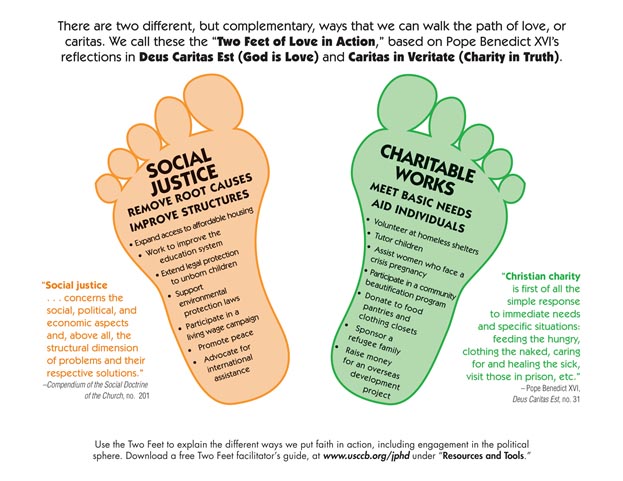The Catholic Campaign for Human Development (CCHD) is a social justice program created by the United States Conference of Catholic Bishops (USCCB) in 1969 to help fulfill Jesus’ mission:
"... to bring glad tidings to the poor ... liberty to captives ... sight to the blind, and let the oppressed go free." (Luke 4:18)
CCHD’s focus is to combat issues that go against the human dignity of the poor through community organizing and economic development throughout the United States.
CCHD Mission Statement:
The Catholic Campaign for Human Development is the domestic anti-poverty, social justice program of the U.S. Catholic bishops.
Its mission is to address the root causes of poverty in America through promotion and support of community-controlled, self-help organizations and through transformative education.
Founded in 1969, CCHD's pastoral strategy is empowerment of the poor through a methodology of participation and education for justice, leading toward solidarity between poor and non-poor as impelled by the Church's biblical tradition, modern Catholic social teaching, and the pervasive presence of poverty in the United States. This ministry for justice is rooted in our baptism and faith commitment.
The grants, economic development, and education for justice programs of the Campaign, implemented in collaboration with local dioceses, are supported from an annual collection in U.S. Catholic parishes.
-Approved by the USCCB-CCHD Committee, November 1992
- Catholic Social Teaching
The social teachings of the Catholic Church are the basis for how and why we do what we do for the poor. Catholic social teaching starts in scripture with the idea that all people are created in the image and likeness of God and expanded by Jesus with his call to help the poor and vulnerable. Over the past 130 years, many popes have added specifics to Catholic social teaching to address the issues of the times such as:
- The Rights of Workers and the Dignity of Work during the Industrial Revolution
- Right to Private Property during the rise of Communism
- Right to Life to combat abortion, euthanasia, and capital punishment
- Care for Creation to combat pollution and bring care for our planet
1. Life and Dignity of the Human Person
2. Call to Family, Community, and Participation
3. Rights and Responsibilities
4. Option for the Poor and Vulnerable
5. The Dignity of Work and the Rights of Workers
6. Solidarity
7. Care for God’s Creation
- Two Feet of Catholic Social Teaching
“The conscience is called by this social teaching to recognize and fulfill the obligations of justice and charity in society.” –Compendium of the Social Doctrine of the Church, no. 83
Catholic social teaching shows that we have two ways to support the dignity of the poor and vulnerable, charitable works and social justice. Charitable works help the poor and vulnerable meet the basic needs such as feeding the hungry, clothing the naked, and giving shelter to the homeless. Social justice attacks the root causes of poverty and removes the structures that take away human dignity from the poor. CCHD supports organizations that work in social justice and reforming social structures to better combat poverty.
- Stories
There are many organizations funded by CCHD all over the country. Here are some stories of organizations that have received funding from CCHD and what they are doing to empower the poor.
BRIDGE: Maryland working for Juvenile Justice
https://therecordnewspaper.org/churchs-anti-poverty-program-giving-the-poor-a-voice-for-50-years/Strangers No Longer and Immigration Reform in Michigan
https://www.detroitcatholic.com/news/michigan-catholic-conference-partners-push-for-state-ids-for-undocumented-immigrants- Funding/Application
National
CCHD funding cannot go to organizations that endorse ideas that go against Catholic social and moral teaching. Some examples are abortion, euthanasia, capital punishment, same-sex marriage, etc.
The process from the USCCB includes an application, meeting with board members of the applying organization, and site visits to the applying organization. We want to make sure that the funding organization will use the grant money to create institutional change to empower the poor while still upholding the Catholic social and moral teaching of the Church.
Local
Applications for Local CCHD grants can be found below. Applicants must fill out the application and write a Proposal Narrative to apply for Local CCHD grant money. Please read the informational booklet before filling out the application.
In the Application, the first page is required to apply, while the rest can be a template to answer some of the questions for the Proposal Narrative.
- PovertyUSA
Sometimes, it is hard to visualize all the people affected by poverty. To solve this issue, the USCCB created the PovertyUSA website to help educate people in the United States about poverty in our country. And while the existence of poverty in our country is saddening, PovertyUSA shows multiple ways for you to help the poor while showing stories of hope.